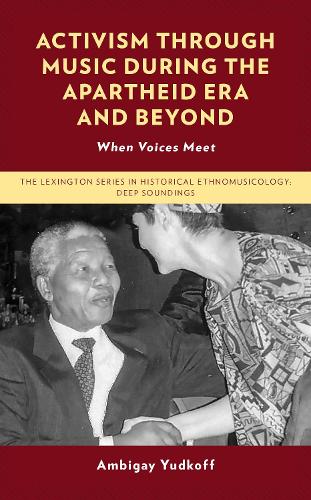
Activism through Music during the Apartheid Era and Beyond: When Voices Meet
(Hardback)
Publishing Details
Activism through Music during the Apartheid Era and Beyond: When Voices Meet
By (Author) Ambigay Yudkoff
Bloomsbury Publishing PLC
Lexington Books
24th June 2021
United States
Classifications
Professional and Scholarly
Non Fiction
Music
Social and cultural anthropology
306.48420968
Physical Properties
Hardback
224
Width 162mm, Height 228mm, Spine 21mm
535g
Description
Activism through Music during the Apartheid Era and Beyond documents the grassroots activism of Sharon Katz and the Peace Train against the backdrop of enormous diversity and the volatile social and political climate in South Africa in the early 1990s. Among the intersections of race, healing and the "soft power" of music, Katz offers a vision of the possibilities of national identity and belonging as South Africans grappled with the transition from apartheid to democracy. Through extensive fieldwork across two countries (South Africa and the United States) and drawing on personal experiences as a South African of color, Ambigay Yudkoff reveals a compelling narrative of multigenerational collaboration. This experience creates a sense of community fostering relationships that develop through music, travel, performances, and socialization. In South Africa and the United States, and recently in Cuba and Mexico, the Peace Train's journey in musical activism provides a vehicle for racial integration and intercultural understanding.
Reviews
Ambigay Yudkoff has written a beautiful account of the musical activism of South African born music therapist and multilingual singer Sharon Katz. In the wake of the release of political prisoner Nelson Mandela and others in 1990, Katz created a "Peace Train," a large South African interracial youth choir for purposes of racial and cultural reconciliation, collaboration between strangers, who literally traveled South Africa and the United States in a train. This is not a conventional story about music and politics but far more about the need for social and emotional healing through singing together in the post-apartheid era. It is one of a few books on musical activism as a mode of social reparation and intercultural understanding that has value well beyond 1990s South Africa.
--Carol Ann Muller, University of PennsylvaniaAuthor Bio
Ambigay Yudkoff is an independent scholar.
